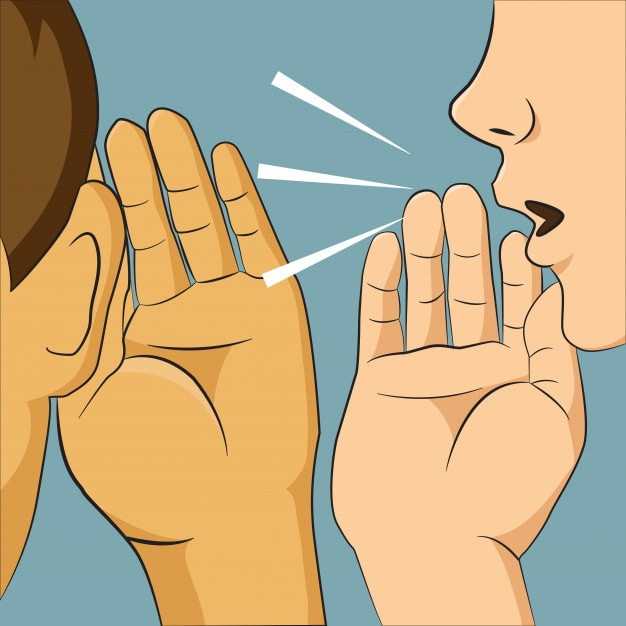Reported speech
Reported speech is one of the most common and useful grammatical structures in both written and spoken language. Reported speech is often used when the speaker or writer wants to retell or report someone else's words. There are usually three main types of reported speech: declarative speech, interrogative speech, and imperative speech. The following article will help you better understand the structure and usage of each type of reported speech.
1. Concepts
Reported speech, also known as indirect speech, is a sentence used when we want to report or repeat a sentence that another person has said.
For example:

We have 2 ways to tell others what Lisa said:
- Repeat exactly what Lisa said: Lisa said, 'I'm tired.'
-
Or paraphrasing Lisa's words: Lisa said that she was tired.
→ This is called reported speech.
2. How to change from direct speech to reported speech
|
Summary: 4 steps to change from direct speech to reported speech:
|
- As you can see above, direct sentences and indirect sentences are quite different. The direct sentence that Lisa said is: I'm tired, but the sentence we narrate is Lisa said that she was tired.
Let's learn 4 steps to convert a direct sentence into reported speech through an example!
Suppose we hear Tom say:
-
I want to see this movie with my girlfriend tomorrow.
Step 1: Choose from narration

To report something someone else said, we would say “He speak that..." or "She speak that..."
In English, we often use two verbs namely said (simple past of say, which means to speak) and told (simple past of tell, means to tell someone):
- Tom said that...
- Tom told Kelly that...
The above example also shows the difference of said and told To be:
- From told must be used when we want to report that Tom spoke to someone else.
- And if we don't want to mention this other person, we use the word say.
Outside said and told, we can also use many other words to describe the nature of speech more clearly:
- asked = request
- denied = deny
- promised = promise
- suggested = suggestion, suggestion
- And many other words
However, these words usually do not use the structure said that or told somebody that, which uses the V-ing or To + Verb structure, for example asked somebody + To Verb or denied + V-ing.
In this lesson, to get familiar with indirect speech, you only need to remember 2 words said and told Is enough. If you want to learn more about the above words, you can study them in the lessons V-ing and To Infinitive Please!
Also, like Vietnamese, we often omit the word that To make the sentence more concise, in English the word that can also be omitted:
-
Tom said that...
With the above knowledge, the provisional statement to this step is:
-
I want to see this movie with my girlfriend tomorrow.
→ Tom said that I want to see this movie with my girlfriend tomorrow.
Step 2: "Return" the verb in a direct sentence to the past

To express that the reported speech is in the past and may not be true in the present, we need to put the verb into the past tense. This operation is often called "regression".
We "post tense" in a general way as follows:
-
Present → Past
-
Future → Future in the past
-
Past → Past perfect
As follows:
|
Direct sentence |
Reported speech |
|
Simple tense For example: work |
Simple past worked |
|
Present continous is/are working |
Past continuous was/were working |
|
Present perfect have/has worked |
Past Perfect had worked |
|
Present perfect continuous have/has been working |
Past Perfect continous had been working |
|
Future simple will work |
Simple future in the past would work |
|
The future continues will be working |
The future continues in the past would be working |
|
Future perfect will have worked |
Future perfect in past would have worked |
|
Future perfect continuous will have been working |
Future perfect continuous in the past would have been working |
|
Simple past worked |
Past Perfect had worked |
|
Past continuous |
Past Perfect continous |
|
Past Perfect |
Past Perfect (no change because it can't be reversed anymore) |
|
Past Perfect continous |
Past Perfect continous (no change because it can't be reversed anymore) had been working |
Modal verbs will be transformed as follows:
-
can → could
-
may → might
-
must = required → had to
-
must = seems → must (constant)
-
could → could (constant)
-
might →might (constant)
-
should → should (unchanged)
In our example sentence, the verb want will be changed to the past form wanted. So the provisional statement to this step is:
I want to see this movie with my girlfriend tomorrow.
→ Tom said that I wanted to see this movie with my girlfriend tomorrow.
Step 3: Change pronouns and possessive adjectives
When Tom says "I want to watch that movie with my girlfriend tomorrow", "I" here is referring to Tom, right!
Therefore, when reporting Tom's statement, we cannot report "I want to see the movie", because "I" is then we. So in the reported sentence "I" must be changed to "he" accordingly.
Understanding this rule, when converting direct sentences to indirect sentences you will need to change the pronouns accordingly.
Below is a table for converting pronouns in reported speech. You really don't need to remember all of the table below, just understanding the rules is enough. This table is just for your reference in case you forget:
|
Direct sentence |
Reported speech |
|
I |
he / she |
|
we |
they |
|
you (singular) |
he / she / I |
|
you (plural) |
they |
|
me |
him / her |
|
us |
them |
|
you (singular) |
him / her / me |
|
you (plural) |
them |
|
myself |
himself / herself |
|
ourselves |
themselves |
|
yourself |
himself / herself / myself |
|
yourselves |
themselves |
Similarly, possessive pronouns and possessive adjectives also need to be changed accordingly:
|
Direct speech |
Reported speech |
|
my |
his / her |
|
our |
their |
|
your (singular) |
his / her / my |
|
your (plural) |
their |
|
mine |
his / hers |
|
ours |
theirs |
|
yours (singular) |
his / her / mine |
|
yours (plural) |
his / her / mine |
So in our example sentence, I will be changed to he, still my will be changed to his. So the provisional narrative up to this point is:
I want to see this movie with my girlfriend tomorrow.
→ Tom said that he wanted to see this movie with his girlfriend tomorrow.
Step 4: Change words of place and time

We also need to change words for place and time. This is quite understandable, because when we narrate another person's statement, we are no longer in the place and time when that person spoke.
Therefore, words indicating place and time will be changed as follows:
|
Direct sentence |
Reported speech |
|
here |
there |
|
now |
then |
|
today |
that day |
|
tonight |
that night |
|
yesterday |
the previous day the day before |
|
tomorrow |
the following day the next day |
|
(two weeks) ago |
(two weeks) before |
|
last (month) |
the previous month the month before |
|
next (month) |
the following month the next month |
|
this |
that |
|
these |
those |
So in our example sentence, this change into that, still tomorrow change into the following day. Finally, we have the complete narrative sentence:
-
I want to see this movie with my girlfriend tomorrow.
→ Tom said thathe wanted to see that movie with his girlfriend the following day.
3. Reported sentence for the question
|
Summary:
|

Reported sentences for a question are similar to reported sentences for a normal sentence as above, with only the following differences:
Use other reporting words
If in a normal reported sentence, we use the word said or told To indicate the meaning of "say" in reported speech for questions we use words like asked, wondered, or wanted to know to express the idea of "asking".
-
asked
-
wondered
- wanted to know
3.1. Reported sentences have question words
For the reported sentence of a question, there is the question word (what, who, when, where, why, how, etc.), you need:
-
Keep the question word
-
Change the position of subject and verb/auxiliary verb
Let's convert the following question into a reported sentence:
-
Tom said "Where can I find Lisa?"
First, we apply the normal reported sentence transformation:
-
Choose reporting words: because this is a question, we use the word asked (ask)
-
Back tense verb: backward tense can wall could
-
Change pronouns and possessive adjectives: change I wall he
→ Tom asked where could he find Lisa.
Now, we do 2 more steps:
-
Retain the question word: retain the word where
-
Swap the positions of subject and verb/auxiliary verb: could he swap into he could
→ Tom asked where he could find Lisa.
For example:
-
Question: When does the meeting start?
Reported speech: She asks when the meeting starts?
-
Question: What are you doing?
Reported speech: She asked me what I was doing.
Additionally, if the subject in the question isIthen we can use To + Verb:
-
Question: Where can I find Lisa?
Reported Sentence 1: He asked where he could find Lisa.
Reported sentence 2: He asked where to find Lisa.
3.2. Yes/No questions
For the reporting of Yes/No questions, you need:
-
Add words if or whether before the question
-
Change the position of subject and verb/auxiliary verb
Let's convert the following question into a reported sentence:
Lisa said to Ben "Did you see Tom this morning?"
First, we apply the normal reported sentence transformation:
-
Choose the reporting word: because Lisa asked Anna, we use asked Ben (ask Ben)
-
Back tense verb: back tense did see wall had seen
-
Change pronouns and possessive adjectives: change you wall he (because you in the original sentence is Ben)
-
Change words indicating place and time: change this morning wall that morning
→ Lisa asked Ben had he seen Tom that morning.
Now, we do 2 more steps:
-
Add words if or whether previous question: Lisa asked Ben if had he seen Tom that morning.
-
Swap the positions of subject and verb/auxiliary verb: had he seen swap into he had seen
→ Lisa asked Ben if he had seenTom that morning.
So we have reported Lisa's question: Lisa asked Ben if he had seen Tom that morning.
For example:
-
Question: Will Jen come to the party next week?
Reported speech: He asked if Jen would come to the party the following week.
-
Question: Have you done your homework?
Reported speech: My mother asked me whether I had done my homework.

